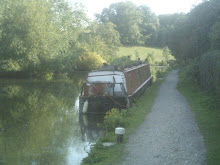| Seems that I and other contributors managed to re-ignite some debate about Continuous Cruisers and Council Tax on Narrowboatworld's Forum recently! This started from some confusion about NABO's view on the subject of whether Continuous Cruisers should pay more. You can see how the debate went in this case by reading the forum but I thought I'd post the key arguments I made on NABO's behalf here too. For the avoidance of doubt it is not NABO policy that Continuous Cruisers should pay a higher BW licence fee than those with long term moorings. We remain committed defenders of the position that your standard BW craft licence should be a universal licence, allowing the boater to travel around the network (or the river they are based on in the case of River Registration) as much or as little as they wish. Yes, we spent some time considering the alternative when BW and others proposed it, as we had a duty to do. After a little thought we rejected the concept on several grounds. The 'Universal Licence' principal above was the main one. Another rather important ground on which to reject the suggestion was that we could find no evidence that genuine continuous cruisers had more financial impact on the waterways than any other boater. When we asked BW to give numerical evidence of this assertion they did not offer anything in response. I can't find the full attribution to this but someone senior in BW was also recently reported as admitting that maintenance costs are NOT significantly changed by the numbers of boats or the amount they use the network. Wear and tear is a minor factor in the whole and BW's repairing liabilities are fairly constant whether lots of people navigate or none. Deterioration by the age of an asset is apparently much more significant than the amount it is used. There is still an ongoing question about whether there are more effective methods by which BW can take stronger enforcement action around overstaying and there is much written on NBW and elsewhere that implies that continuous cruisers are the root of all evil on this one! The evidence we have is that continous cruisers are no more or less guilty on that front than boaters with moorings. For instance we did some rough analysis of BW patrol activity and calculated that even if BW were only giving patrol notices to people registered as continuous cruisers, the totals showed that 80% of CCer's could never have received a patrol notice. Given the possibility that some boats would get more than one patrol notice, the actual percentage where BW had no record of individual cases ever coming to the attention of the patrol teams was probably higher still. If you then considered the 'not continuous cruiser' balance, those who had received notices but had home moorings registered with BW, the maths showed that boats with long term mooring were only a few percent less likely to overstay that those without moorings. To date BW have not refuted this analysis and there is an open invition from me at least to BW to provide evidence to the contrary. Hence my personal view is also that there are some sour grapes going on out there. Targeting continuous cruisers more strongly than other boaters is pure and simple prejudice, based on hearsay (as opposed to solid evidence). In both cases let's also remind ourselves that it is a very small minority of boaters as a whole who overstay. Why should the misbehaviour of a small minority be a valid excuse to financially penalise the majority of Continuous Cruisers but not those with long term moorings? That proposition seems arbitrary to say the least. The other consideration in all this was that administratively it would be a nightmare to have two licence bands and we have huge doubts about whether it could be applied fairly, even if it was desirable. (We also have severe doubts whether effectively creating a new class of licence is legislatively permissible.) Many continuous cruisers pay for longer stay moorings when they have the desire or need to be in one place for a little longer. Most commonly people will stop in two or three paying places over winter months, in boatyards, marinas, clubs or on BW designated winter moorings. If you had the higher charge system in place, should their licence fees for those weeks be reduced to standard rate for the period the boater is paying for a mooring? What about people who moor off BW water? When they are on BW water they are continuously cruising. Should they pay the higher or the lower rate? I hope these comments will dismiss any suggestion that NABO in anyway supports the introduction of a higher charge for continuous cruisers. Our considered view is it is un-necessary, unjustified and more practically, unworkable. The closing statement on the NABO web page that Canaldrifter referred to sums our current position up: "Continuous Crusing is an important right of navigation that is worth cherishing not penalising." (For those who don't know it I am the NABO Council Member for "Mooring Matters". On the personal I am am a BW long-term residential mooring customer.) |
Subscribe to:
Post Comments (Atom)


No comments:
Post a Comment